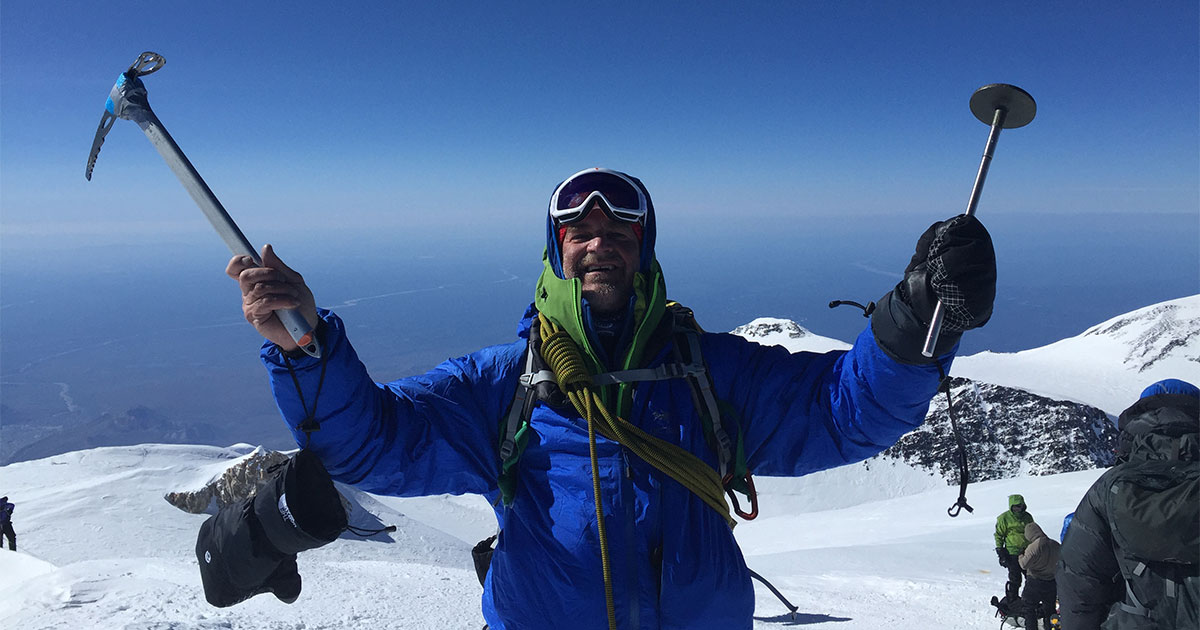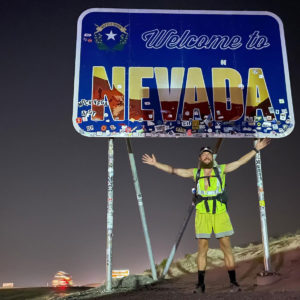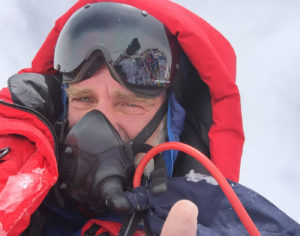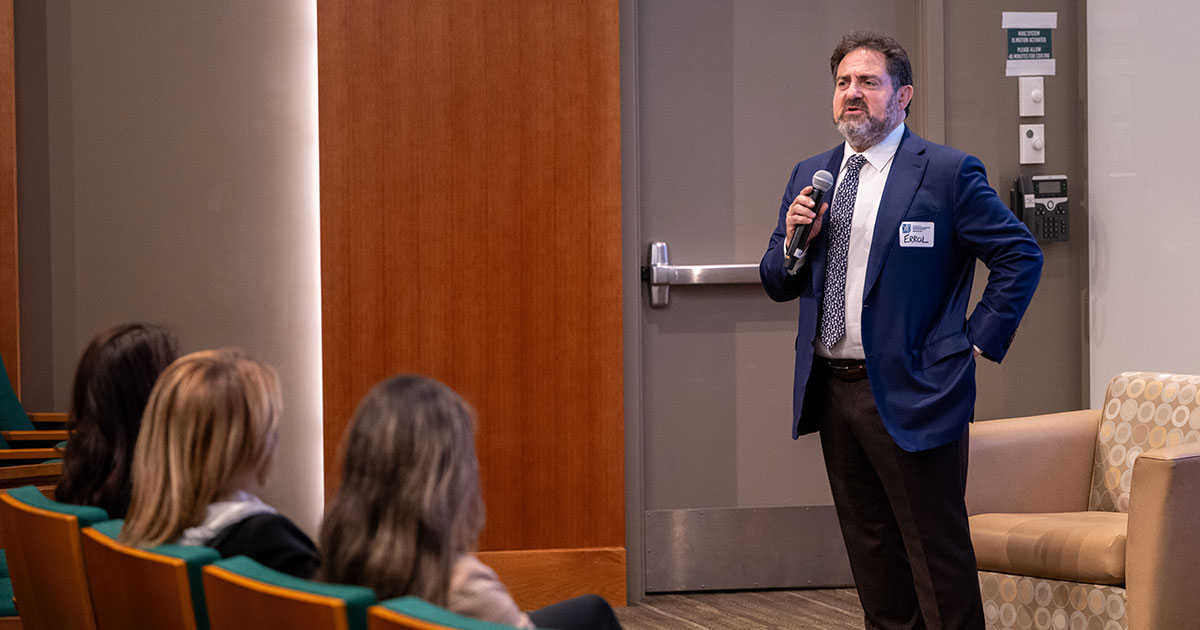The Alumni Adventurers

For Alexander von Cramm ’86, the idea was planted in his early adolescence, as he watched a documentary about a man who climbed Mount Everest. Von Cramm was riveted.
“It fascinated me,” he says. “The colors. The blue skies. The white mountains. The drama. That stuck in me as a 13-, 14-year-old. It was ingrained in my mind. I wanted to experience something like this.”
For Michael McStravock ’14, it all began with a marathon three years ago. The hard work of the race, the feeling of accomplishment as he crossed the finish line—it awakened something in him. He tried a 50-kilometer race, then a 100-kilometer one. “It was epic,” he says. “I wanted more.” Next, he tried a 100-mile race, but still he wanted to go farther.
Driven to push themselves, von Cramm and McStravock went on to pursue challenges that are demanding and daring. The former would climb not only Everest but also what are known as the Seven Summits, the highest peaks on the seven continents. McStravock, meanwhile, would complete a solo run across America, from Boston to Los Angeles, an arduous task that took nearly half a year.
From the highways and byways of America, to mountains that climb above the clouds and scrape the sky, this is the story of their adventures.
The Coast-to-Coast Runner
To run across the country means seeing beautiful landscapes that can move you to tears. But, it also means being drenched in the rain, traveling desolate roads where food is scarce, and dealing with nagging aches and pains.
One such painful day happened only 200 miles into McStravock’s journey across the country, as he tried to make his way through New York City. He sat in a Bronx juice bar, his feet propped up on a stool. His shins on fire, he drank a smoothie while holding bags of ice that the shop gave him on his legs.

Michael McStravock ’14 crosses into Nevada on his running trip across America.
Soon enough, he was moving again. “The only way to get past it is to take another step,” says McStravock, who is a member of the Boston Red Sox grounds crew. “It was a matter of getting off that stool and trying again. I just had to keep going.”
That’s exactly what McStravock did, day after day. As he ran, he didn’t dwell on the hundreds of miles he still needed to cover. He didn’t fret about what mountains he had yet to cross, or what unexpected challenges might pop up. Instead, he stayed in the present, focusing on the roughly 30 miles he might run in a typical day. “You don’t worry about tomorrow yet,” he says. “I would only worry about the day ahead of me.”
Each of those daily runs added up. Eventually, McStravock would cover 3,200 miles across 16 states. Along the way, he carried a 20-pound pack filled only with necessities, including first-aid supplies, several changes of clothes, a lightweight sleeping bag, and hammock.
He didn’t do much planning. Yes, the first two weeks he had scoped out places to stay, but after that, he took each day as it came. “You just start and learn as you go,” he says. Sometimes, he slept in a cheap motel, especially if he hadn’t taken a shower in a while, but often he spread out his sleeping bag and hammock in a park or behind a church. So as not to attract attention, he would make camp later in the night and then leave early in the morning. “I stealth camped,” he says.
He ate constantly. His sports watch said he burned about 5,000 calories a day. “I really couldn’t eat enough,” he says. Gatorade and Snickers bars were mainstays, as were trail mix, pickles, and pickle juice. In populated areas where restaurants were plentiful, he ate Mexican food and lots of cheeseburgers. When restaurants were hard to find, he relied on gas station food: protein bars, burritos, canned coffee, and more Snickers bars.
“Live big. And, do it while you can. If there’s something you want to do, just do it. Nothing is promised in life.”
Michael McStravock ’14
Everywhere he went, people expressed amazement at what McStravock was doing. Why run so far, they wanted to know. “I got that question every day,” he says. “I would typically say, live big. And, do it while you can. If there’s something you want to do, just do it. Nothing is promised in life.”
Meeting people from all over the country was the highlight of the trip. “We are all very similar. People just want to be seen and loved and have a good time,” says McStravock, who was so moved by a visit to a Nevada reservation of the Southern Paiute tribe that he started raising money for a pow wow held in honor of its veterans.
After 173 days of running, he arrived in Venice Beach, California, last October. Taking off his pack, he ran into the water. “It was a rush of emotion, for sure,” he says. “It was hard to believe it was over. It was the experience of a lifetime.”
The Mountain Climber
Trying to climb the Seven Summits requires serious patience and mental toughness. “It’s 30 percent physical and 70 percent mental,” says von Cramm, a managing partner of Germany’s Alpha Real Estate Group.
Von Cramm didn’t successfully reach the top of 22,841-foot Aconcagua, for instance, until his third attempt. The first time he took on the highest mountain in South America, the airline lost his luggage. Not outfitted with the proper equipment, he had to end his climb after 10 days. He lasted longer for his second attempt, but not feeling as fit as he needed to be, he quit just a day before he would have reached the summit. “I failed again,” he says. “That was frustrating.”

As is typical on the highest reaches of Mount Everest, Alexander von Cramm ’86 used supplemental oxygen when climbing the mountain.
Or consider the patience required when, on his ascent of the 20,310-foot Denali, the weather turned nasty. “The weather there can be extremely tough,” he says. For a week, he was forced to take shelter inside his tent. “You’re halfway up the mountain,” he says. “You can’t go up, and you can’t go down. Visibility is zero.”
Unable to move, day after day, on the tallest peak in North America, he had nothing to do but wait. “I’m lying there. I don’t know what to think about,” he says. To help, his tentmate taught him how to meditate, and in time, the weather finally changed. “We made it to the summit,” von Cramm says. “We got lucky.”
Von Cramm’s quest to climb the Seven Summits started in 2004. That was when he ascended Mount Kilimanjaro, the highest peak in Africa at 19,340 feet. Through the next 17 years, he kept at it. He ascended 29,032-foot Everest, the mountain that first inspired him as a kid and the tallest and most challenging of the Seven Summits, in 2016.
The highest reaches of Everest, where the oxygen level is dangerously low, are known as the Death Zone. At those heights, moving becomes a struggle. To keep going requires willpower. “Your body is run down. You get sick and tired,” he says. “Your brain has to tell you to keep walking, keep eating. Your brain is in survival mode. Quitting is not an alternative. Otherwise, you die.”
He would lose two finger tips to frostbite on his climb of Everest, but to reach the summit and stand on top of the world was awe-inspiring. “In a way, it was life-changing,” von Cramm says.
“Your brain has to tell you to keep walking, keep eating. Your brain is in survival mode. Quitting is not an alternative. Otherwise, you die.”
Alexander von Cramm ’86
He climbed the last of the Seven Summits, the 16,050-foot Vinson Massif in Antarctica, late last year. The landscape was desolate and remote. “There is nothing there,” he says. “There is nothing alive. The penguins, the birds—you don’t see that in the middle of the continent. It is nothing compared to anything I’ve seen.”
Once the climb was finished, von Cramm wasn’t able to leave Antarctica because planes couldn’t pick up him and his fellow climbers due to bad weather. For seven days, he waited, and just like on Denali, was stranded in his tent. That tent was all that stood between him and the crushing cold outside. “Your tent is your castle,” he says. “If your tent rips, you’re history.”
When he finished the Seven Summits, von Cramm felt elated at having achieved a goal he had pursued for so long, and he was grateful for the people he met and the beautiful places he saw along the way. He encourages others to pursue their passions, wherever they may lead. “Whether it’s mountaineering or other stuff, live your dream,” he says. “Just do it.”
Posted in Community




